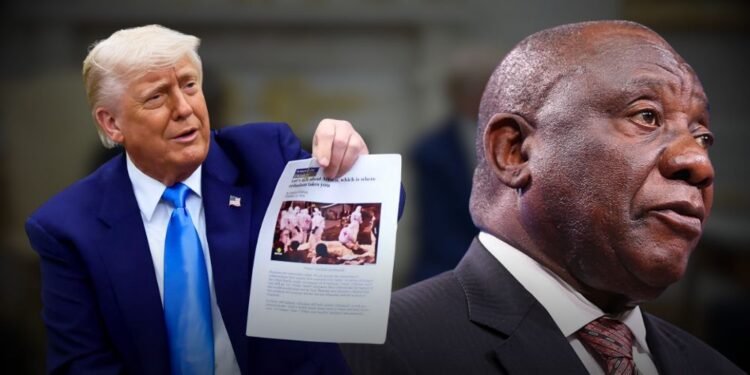In a highly publicized Oval Office meeting on May 21, 2025, U.S. President Donald Trump confronted South African President Cyril Ramaphosa with claims of a “white genocide” occurring in South Africa.
The encounter, marked by the presentation of controversial videos and unverified data, has ignited global discussions about crime, race, and the spread of misinformation.
The Oval Office Confrontation
During the meeting, President Trump presented a video compilation featuring South African opposition figures, including Julius Malema, singing the apartheid-era song “Dubul’ ibhunu” (“Shoot the Boer”).
Trump interpreted this as evidence of incitement to violence against white farmers. He also displayed images of white crosses along a roadside, claiming they marked the graves of murdered white farmers. However, these crosses were part of a protest memorial and did not represent actual burial sites .
President Ramaphosa responded by emphasizing that South Africa is a democratic nation with a commitment to addressing crime affecting all citizens, regardless of race. He clarified that the song in question is a historical protest song and does not reflect current government policy .
Examining the Claims
President Trump’s assertion of a “white genocide” lacks support from official data. According to the South African Police Service, there were 26,232 murders in the country in 2024, with 44 linked to farming communities. Of these, eight victims were farmers. The data does not indicate a racially targeted campaign against white farmers .
Furthermore, some of the materials presented by President Trump have been discredited. Notably, an image he claimed depicted a burial site for white farmers was actually from a Reuters video shot in the Democratic Republic of Congo .
The Broader Context
While farm attacks in South Africa are a serious concern, experts agree that they are part of the country’s broader crime challenges and are not racially motivated. The narrative of a “white genocide” has been propagated by far-right groups and lacks empirical support .
Conclusion
The Oval Office meeting between Presidents Trump and Ramaphosa underscores the importance of relying on verified information when discussing sensitive issues. While addressing crime is crucial, it is equally important to avoid spreading unfounded narratives that can inflame tensions and distort reality.












